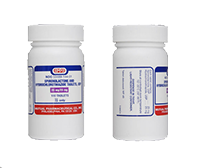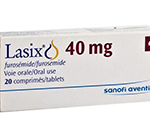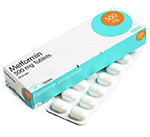
Hydrochlorothiazide

What is Hydrochlorothiazide?
Hydrochlorothiazide is a drug that facilitates the elimination of water and salts (in particular, sodium and potassium) from the body by increasing the production and elimination of urine (a diuretic drug). It is used to lower blood pressure when it is too high (“arterial hypertension”) and to eliminate the collection of liquids that can form in the tissues (edema), due to various diseases. The drug does not cure hypertension but serves to keep it under control.
Hydrochlorothiazide inhibits sodium reabsorption in the distal tubule, causing an increase in the excretion of sodium and water as well as potassium and hydrogenions. The diuretic effect is established within 1-2 hours of administration and lasts 6-12 hours. Absorption after oral administration is 50-80%. It is 68% bound to plasma proteins and has a plasma half-life of 5.6-14.8 hours. It is not metabolised and is excreted as such in urine.
Hydrochlorothiazide, also known as HCTZ, is a diuretic medication that helps remove excess water and salts from the body. Many patients ask, What is HCTZ 25 mg? It is a common dosage used to treat conditions like high blood pressure and fluid retention caused by edema. For those with milder symptoms, lower doses like HCTZ 12.5 or HCTZ 12.5 mg are often prescribed. Another variant, HCT 12.5, may also be suitable depending on the individual’s condition.
Tablet forms such as hydrochlorot 25 mg tab unic and hydrochlorot 25mg tab are popular choices for easy, consistent dosing. A related medication, chlorothiazide 25 mg, offers similar therapeutic effects for managing fluid buildup or hypertension. Always consult your healthcare provider to determine the most appropriate dosage and formulation for your needs.
Hydrochlorothiazide uses
 Hydrochlorothiazide is used in the treatment of edema of cardiac origin (mild or moderate congestive heart failure), ascites resulting from liver cirrhosis, and renal diabetes insipidus. Hydrochlorothiazide both in monotherapy and in combination with other antihypertensive drugs – can also be used in the treatment of hypertension.
Hydrochlorothiazide is used in the treatment of edema of cardiac origin (mild or moderate congestive heart failure), ascites resulting from liver cirrhosis, and renal diabetes insipidus. Hydrochlorothiazide both in monotherapy and in combination with other antihypertensive drugs – can also be used in the treatment of hypertension.
Hydrochlorothiazide starts to carry out its diuretic action after about 2 hours and achieving maximum effectiveness at the fourth hour, can be taken easily by mouth. The diuretic effect of Hydrochlorothiazide is due to the presence of hydrochlorothiazide, the active ingredient benzothiazidic able to mainly increase the excretion of sodium and chlorine, but in second analysis also of potassium and magnesium, inhibiting the sodium / chlorine transporter expressed on the surface apical of the cells of the distal convoluted tubule of the nephron.
The diuretic action of Hydrochlorothiazide is generally followed by a direct antihypertensive action on the vascular smooth muscle, mediated by the increase in the exchange activity of the sodium / calcium channel. The increased flow of this element from the muscle cell to the blood, accompanied by a reabsorption of cellular sodium, guarantees a better control of the spastic contraction of my arterial fibrillary cells.
After its action, which lasted for about 6/12 hours, the hydrochlorothiazide is eliminated via the kidneys.
It should be taken preferably in the morning, after breakfast. If a second dose is needed, it can be taken in the early hours of the afternoon, unless otherwise advised by the doctor. If you miss a dose, see to it as soon as possible; however, if the next dose is due, leave the forgotten dose and continue following the prescribed schedule. Do not stop therapy without first consulting your doctor. Antihypertensive treatment may need to be continued throughout life.
Administration and usual doses
| Adults | Elderly | |
|---|---|---|
| In the treatment of edema | In the treatment of hypertension | In some patients a dose of 12.5-25 mg per day may be sufficient |
| At the beginning 25-50 mg a day, with increases up to 100 mg a day in 1-2 doses; to be reduced, if possible, in maintenance. | 25-50 mg a day | |
Hydrochlorothiazide has a range of applications beyond its diuretic and antihypertensive effects. Hydrochlorothiazide 12.5 mg for high blood pressure is commonly prescribed to control mild hypertension, often as part of combination therapy. For more significant cases, a Hydrochlorothiazide 25 mg tablet may be used to enhance blood pressure management and reduce fluid retention.
Patients frequently ask, What is HCTZ 25 mg? This dosage is particularly effective for edema caused by heart, liver, or kidney conditions, as well as for high blood pressure. Among the many Hydrochlorothiazide 12.5 mg uses, it can treat kidney stones by reducing calcium excretion and help manage mild fluid retention in various conditions.
Questions such as What is Hydrochlorothiazide 12.5 mg? and What is Hydrochlorothiazide 12.5 mg used for? highlight its role in addressing milder symptoms, often as a starting dose. Similarly, What is Hydrochlorothiazide 12.5 used for? includes preventing kidney complications in diabetic patients and maintaining electrolyte balance. For those needing higher doses, Hydrochlorothiazide 25 mg used for managing severe edema or resistant hypertension offers significant relief. The convenience of formulations like HCTZ tab 25 mg ensures precise dosing for long-term therapy. Always consult your doctor for personalized advice on dosage and treatment duration.
How to use Hydrochlorothiazide
For adults managing hypertension, hydrochlorot 12.5 is often prescribed as a starting dose. This low dose helps control mild cases and is suitable for long-term use. If needed, the dosage can be adjusted under a doctor’s supervision.
In more severe conditions, HCTZ 25mg is commonly used to address persistent high blood pressure or significant fluid retention. The dose may be divided into two smaller doses during the day to maximize effectiveness and minimize side effects.
Always consult a medical specialist to determine the right dose for your condition. Do not adjust or stop your treatment without professional guidance. With medications like hydrochlorot 12.5, careful monitoring ensures safety and successful symptom management.
Hydrochlorothiazide effects
Hydrochlorothiazide improves blood flow by reducing fluid retention and relaxing blood vessel walls. This action benefits individuals with high blood pressure and can mildly impact those with normal blood pressure. However, in patients prone to hypotension, caution is needed to avoid excessive drops in blood pressure.
Taking HCTZ 25mg consistently may indirectly enhance self-confidence and interpersonal relationships by improving health and energy levels. Studies also suggest that diuretics like Hydrochlorothiazide dosage 12.5 mg can positively affect intravaginal latency time, indirectly influencing sexual health.
Responses to the drug vary widely, with individual sensitivity playing a significant role in its effectiveness. For some, the question is 12.5 mg of Hydrochlorothiazide effective? depends on their condition, while others might find is 25 mg of Hydrochlorothiazide effective for more severe symptoms. Comparing Hydrochlorothiazide dosage 12.5 mg vs 25 mg shows that higher doses like HCTZ 25 mg daily can be more effective but may also increase risks.
Tips to improve response include taking the medication on an empty stomach, avoiding alcohol, and strictly following prescriber instructions. Adjusting the Hydrochlorothiazide dosage 25mg or trying smaller doses like Hydrochlorothiazide 6.25 mg under supervision can help reduce side effects of Hydrochlorothiazide 12.5 mg.
Continued use is key, as the best results often develop over time. For example, Hydrochlorothiazide for edema provides lasting relief when the body adjusts to its diuretic effects. Always adhere to your doctor’s guidance and the manufacturer’s insert for optimal results.
Hydrochlorothiazide side effects
 In addition to the beneficial effects, each drug can have some side effects. This drug is generally well tolerated; however, sometimes disorders such as: dry mouth, intense thirst, feeling of tiredness (which is generally reduced with the continuation of treatment), stomach pain, nausea, diarrhea, feeling of dizziness and empty head, increased sensitivity to light solar (erythema), rarely impotence (talk to your doctor if this disorder occurs and causes you to quit therapy). Contact your doctor if you notice signs of excessive loss of potassium salts, such as: irregular heartbeats, mood changes, cramps or muscle pain, fatigue and weakness or other disorders. Report any other effects deemed to be attributable to the drug to the doctor.
In addition to the beneficial effects, each drug can have some side effects. This drug is generally well tolerated; however, sometimes disorders such as: dry mouth, intense thirst, feeling of tiredness (which is generally reduced with the continuation of treatment), stomach pain, nausea, diarrhea, feeling of dizziness and empty head, increased sensitivity to light solar (erythema), rarely impotence (talk to your doctor if this disorder occurs and causes you to quit therapy). Contact your doctor if you notice signs of excessive loss of potassium salts, such as: irregular heartbeats, mood changes, cramps or muscle pain, fatigue and weakness or other disorders. Report any other effects deemed to be attributable to the drug to the doctor.
Hydrochlorothiazide, like other thiazides, can cause the following side effects:
- postural hypotension
- modest gastrointestinal effects
- hypokalemia
- hypomagnesaemia
- hyponatremia
- hypercalcaemia
- hypochloraemic alkalosis
- hyperuricemia
- gout
- hyperglycemia
The drug may cause changes in plasma lipid concentrations. The incidence of sexual dysfunctions (eg difficulty in erection) is greater with thiazides than with other antihypertensive agents, but generally does not require suspension of treatment. Less commonly, hydrochlorothiazide can induce rash, photosensitivity and haematological disorders. Pancreatitis, intrahepatic cholestasis and hypersensitivity reactions (including pneumonias, pulmonary edema and severe skin reactions) have also been described.
The likelihood of Hydrochlorothiazide side effects often increases with higher doses. Lower doses like Hydrochlorothiazide 6.25 mg or 12.5 Hydrochlorothiazide generally cause fewer adverse effects, making them a safer starting point for treatment.
One common concern is Hydrochlorothiazide side effects potassium depletion, which can lead to fatigue, cramps, or irregular heart rhythms. Symptoms may be more noticeable at higher doses. Hydrochlorothiazide 12.5 mg side effects, such as mild dizziness or electrolyte imbalances, can often be managed by drinking plenty of fluids and eating potassium-rich foods.
For those wondering about side effects of Hydrochlorothiazide 12.5 mg, these are typically milder and less frequent compared to higher doses. Monitoring your body’s response is key, and regular checkups can ensure safe adjustments to your Hydrochlorothiazide dosage if needed.
To minimize side effects, take the medication at the same time each day, preferably in the morning. Avoid alcohol, which may intensify dizziness or dehydration. Always follow your doctor’s advice, and give your body time to adjust, as many side effects subside with continued use. Should side effects persist, consult your doctor for possible dose adjustments or alternative options.
Hydrochlorothiazide safety of use
Like in case with all diuretics, it is advisable to assess the plasma levels of the electrolytes before proceeding with the administration of Hydrochlorothiazide, and if necessary, correct them.
In diabetic patients it is necessary to administer the drug with particular care, as it may be required to adjust the dose of the hypoglycemic drug, given the hyperglycaemic effect of hydrochlorothiazide. In hyperuremic patients, the haemoconcentration effect following the administration of Hydrochlorothiazide could lead to an increase in gout attacks.
Given the increased secretion of potassium, determined by the saluretic effect of hydrochlorothiazide, to avoid episodes of hypokalemia, with consequent associated symptoms, it could be useful to add a diet rich in potassium to pharmacological therapy.
It is also necessary to consider that diuretics, and in particular thiazide ones, expose the patient to potential hypokalemia, with symptoms characterized by a significant decrease in perceptive and reactive capacities, which could make driving or the use of machinery dangerous.
When following Hydrochlorothiazide warnings, patients should monitor their symptoms closely and report any unusual reactions to their doctor. Individual sensitivity to doses like Hydrochlorothiazide 6.25 mg, Hydrochlorothiazide 12.5 mg, or Hydrochlorothiazide 25 mg may vary. Lower doses are typically safer for individuals prone to side effects, while higher doses require closer supervision.
To enhance safety, avoid taking Hydrochlorothiazide with alcohol, as it may increase the risk of dizziness and dehydration. Patients should maintain a potassium-rich diet and stay hydrated to minimize risks associated with electrolyte imbalances.
While Hydrochlorothiazide 25 mg is effective for significant fluid retention or high blood pressure, it can increase the likelihood of adverse effects, including muscle weakness or fatigue. Regular medical checkups, adherence to prescribed doses, and reading the manufacturer’s insert are essential steps for ensuring safe and effective use of Hydrochlorothiazide. Always consult your doctor before making any changes to your medication routine.
Pregnancy and breastfeeding
The use of diuretics such as hydrochlorothiazide, could determine an alteration of the normal blood flow to organs important for the growth of the fetus, compromising their development; therefore the use of this drug is not recommended during the first trimester of pregnancy, and subsequently only under strict medical supervision. Instead it would be necessary to suspend breastfeeding during the therapeutic protocol.
Pay attention to the following drug interactions:

Hydrochlorothiazide could increase the side effects of lithium salts, reducing their excretion, and curare derivatives.
The hypotensive action of this drug could be enhanced by the concomitant administration of other antihypertensives, alcohol or barbiturates, and inhibited by the simultaneous administration of non-steroidal anti-inflammatory drugs.
Concomitant use of corticosteroids, on the other hand, could increase potassium loss and expose the patient to more or less severe symptoms depending on the extent of the loss.
Contraindications
Refractory hypokalaemia, hyponatremia, hypercalcaemia; severe liver and kidney failure; symptomatic hyperuricemia, Addison’s disease; hypersensitivity to the drug, to thiazides, to sulfonamide derivatives.
Report all the medications you are taking to your doctor, if you have serious kidney or liver diseases or if you suffer from other important diseases; signal if diarrhea or persistent vomiting appear which can lead to a further and excessive loss of water and salts. Report if you have ever suffered from “allergies” to drugs or diseases such as eczema, asthma, hives.
Do not take Hydrochlorothiazide alongside:
- with NSAIDs: increased risk of NSAID nephrotoxicity; NSAIDs, in particular indomethacin and ketorolac antagonize the diuretic effect
- with hypoglycemic agents: the hypoglycemic effect is antagonized by thiazide diuretics
- with cardioactive glycosides: their toxicity can be increased if the diuretic induces hypokalemia or hypomagnesemia
- with lithium salts: thiazides reduce the renal excretion of lithium, increasing the risk of the appearance of toxic effects. Concomitant use must therefore presuppose constant monitoring of lithium levels.
- with ion exchange resins: the absorption of the diuretic can be reduced (the administrations of the two drugs must be spaced between them for at least two hours
- CNS depressive drugs: drug-induced orthostatic hypotension can be accentuated by alcohol, barbiturates and drugs.
Hydrochlorothiazide online review
Online reviews highlight the effectiveness and challenges of using Hydrochlorothiazide. Users frequently ask, What is Hydrochlorothiazide 25mg used for? The consensus shows it is helpful for managing high blood pressure and fluid retention. Many reviewers confirm, Is 25 mg of Hydrochlorothiazide effective? The answer is often yes, particularly for severe cases. Patients report positive results for reducing swelling, especially when using Hydrochlorothiazide for edema or as a diuretic 25 mg.
Smaller doses like Hydrochlorothiazide 12.5 mg cp or 12.5 Hydrochlorothiazide are praised for causing fewer side effects. Users wondering, What is Hydrochlorothiazide 12.5 used for? find it effective for milder conditions or as part of combination therapies. Negative feedback mentions mild side effects, such as dizziness, and the unavailability of Hydrochlorothiazide 25 mg tab or Hydrochlorothiazide 25mg tab in physical pharmacies across the U.S. This often leads patients to rely on online orders.
Questions like, What is HCTZ 25mg? and Hydrochlorothiazide 25 mg what is it used for? commonly appear in forums, with answers emphasizing its versatility for various conditions. Overall, users recommend consulting a healthcare provider to determine the correct dosage and ensure safety.
Hydrochlorothiazide in the U.S.
Hydrochlorothiazide, including hydrochlorot 25 mg and 25 mg Hydrochlorothiazide, is only available online in the U.S. To ensure safety, choose a reputable pharmacy with clear credentials, verified reviews, and a requirement for a valid prescription.
Patients often rely on HCTZ 25 mg daily or lower doses like Hydrochlorothiazide 6.25 mg or HCT 12.5, depending on their treatment plan. If you’re unsure, our customer support is available to guide you through the purchasing process and answer your questions.
Products like Hydrochlorothiazide 25 mg tab or chlorothiazide 25 mg are widely sought after for managing high blood pressure and fluid retention. When considering Hydrochlorothiazide 25 mg used for specific conditions, consult a doctor to ensure the correct dose is chosen.
By choosing a trusted online pharmacy and following medical advice, you can safely obtain Hydrochlorothiazide for your needs.
Hydrochlorothiazide and analogs in the U.S.
- Aquazidea – Sun Pharmaceuticals Industries Ltd.
- Bpzide – Stadmed Pvt. Ltd.
- Hydride – Micro Labs Ltd (Cardicare)
- Klorzidea – Zydus Cadila Healthcare Ltd.
- Xenia – US Vitamins Limited
Where to buy Hydrochlorothiazide
Ordering Hydrochlorothiazide online offers convenience, competitive pricing, and access to a range of dosages, including Hydrochlorothiazide 25 mg and Hydrochlorothiazide 12.5 mg. Trusted online pharmacies ensure the availability of authentic medication with detailed product information.
The FDA approves of purchasing pills online, provided certain rules are followed. Having a valid prescription is essential, as is ordering quantities that correspond to personal treatment needs. Adhering to these guidelines ensures both safety and compliance.
Before ordering, review Hydrochlorothiazide warnings to understand potential side effects and interactions. Always consult a healthcare provider to confirm the suitability of this medication for your condition. With careful adherence to these rules, ordering Hydrochlorothiazide online can be a safe and efficient option.
Posted in Blood Pressure
(1 voices, average: 5 of 5) 6006 views






















